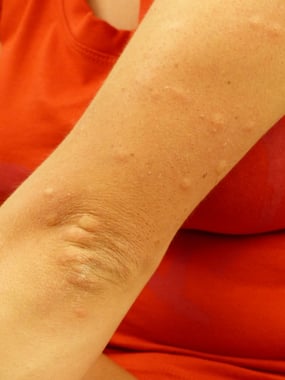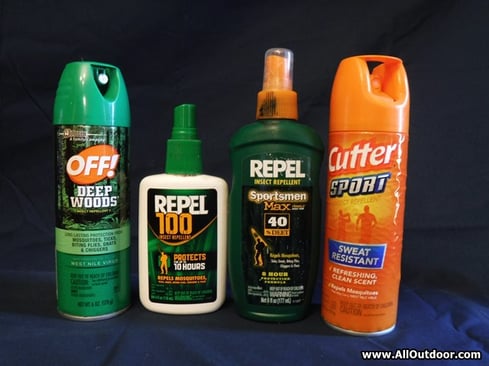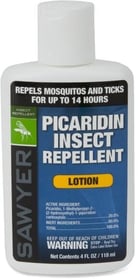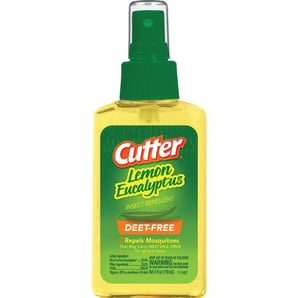Once you’re ready to put on shorts and a t-shirt and enjoy the great outdoors, mosquitoes and ticks are ready to attack. If you’re sick of getting bit by mosquitoes and worrying about tick bites, products with DEET may be your solution. With sprays, lotions, and wristbands available for consumers you may be wondering is DEET safe? “Natural” and DEET-free options are side by side on shelves at stores, so it can be difficult to make a decision when choosing the repellent that works best for you and your family. Continue reading this article to learn more about DEET with facts supported by the EPA, CDC, National Capital Poison Center, and the National Pesticide Information Center.

Photo Credit: lymedisease.org
What is DEET?
DEET is a repellent that was developed by the U.S. Army in 1946 for the protection of soldiers in insect-infested areas and became approved for use by the general public in 1957. It’s primarily used in products that are applied directly to the skin or on clothing to repel mosquitoes and ticks in the form of lotions, sprays, roll-ons, and bracelets. DEET is not the same as citronella, which is the active ingredient in non-wearable products such as candles and is not made from essential oils. Products containing DEET help individuals to avoid coming into contact with mosquitoes and ticks that can transmit various diseases such as Zika virus and Lyme disease.
How does DEET work?

It’s important to know that DEET does not kill mosquitoes and ticks. DEET repels these pests that approach you by creating an invisible barrier around the areas where the product has been applied, making you undetectable to mosquitoes and ticks. Products that contain DEET display the amount of the ingredient by percentage. It’s important to note that higher percentages do not indicate a higher strength of DEET. The amount of DEET within a product dictates how long it will last once applied. For example, a product with 25% DEET will last several hours. However a product containing 4% DEET will last a much shorter length of time. When applying DEET, it’s important that you follow the instructions to remain safe.
What products contain DEET?

Examples of insect repellents that contain DEET
You can easily find products that contain DEET by visiting most convenience stores, pharmacies, grocery stores, or big box retailers. The most common type of repellent are sprays, but you should always do your research to find the best product for your needs. Click here to learn more about types of repellents approved by the EPA to help you make the best selection.
What are the health impacts of DEET?
It’s only normal that you might be uncertain about how a chemical such as DEET can interact with your health. For your information, the EPA has released the following statement about DEET usage:
“The normal use of DEET does not present a health concern to the general population, including children. As always, consumers are advised to read and follow label directions in using any pesticide product, including insect repellents. Currently registered uses of DEET are also not expected to result in adverse effects for listed and non-listed endangered species, or critical habitat. As such, EPA concludes “no effect” for listed species and no adverse modification of designated critical habitat for all currently registered uses of DEET.
EPA issued an Interim Decision for DEET in September 2014. We concluded that:
- no additional data are required at this time; and
- no changes to the affected registrations or their labeling are needed at this time.
The human health risk assessment concluded that there are no risks of concern because no toxic effects have been identified when used as a dermally applied insect repellent, and there is no dietary or occupational exposure for DEET. However, a Final Decision on the DEET registration review case will occur only after the EPA has completed an Endocrine Disruptor Screening under FFDCA section 408(p). Under the Endocrine Disruptor Screening Program, EPA has prioritized chemicals for screening and DEET is lower on the priority list than chemicals currently being tested.”
If you are interested in learning more about this study, click here. The best way to use DEET is always to follow the exact instructions on the packaging. Most cases of adverse skin rashes in association with DEET usage occur due to improper application.
Does DEET cause cancer?
The National Pesticide Information Center provided the following response to consumer concerns about DEET’s potential impact on cancer in humans.
“Researchers have not found any evidence that DEET causes cancer in animals or humans. DEET has been classified by the Unites States Environmental Protection Agency (U.S. EPA) as "not classifiable as a human carcinogen," which means that there is not enough evidence to say that it does or does not cause cancer.”
If you are still unsure if DEET is the best option for your needs, please ask your doctor for more clarification on chemicals and health interactions.
Are there any alternatives to DEET?


Being prepared for mosquito and tick-prone areas is the best defense against diseases such as Lyme disease, Zika virus, Powassan virus, and Rock Mountain spotted fever. Although DEET is very effective, there are alternative products that you can use. The CDC recommends repellents containing picaridin and oil of lemon eucalyptus. Things that are proven not to work are wristbands and wearables, oral garlic and vitamin B1 supplements, and ultrasonic devices. Unfortunately, consumers are often misled when it comes to “natural” and “organic” options that do not live up to their claims and are not backed up by any credible research.
Should I use DEET?
Although studies have proven that DEET is safe and effective, it isn’t always the best option for everyone. It’s important that you thoroughly research the options yourself or speak with your doctor to make an informed decision.
We’re always here if you need us. Cooper Pest Solutions provides mosquito and tick control services for your yard with service coverage all season long.
Please feel free to learn more about DEET from the following sources:
http://npic.orst.edu/factsheets/DEETgen.html
https://www.epa.gov/insect-repellents/deet
https://www.poison.org/articles/2007-jun/use-deet-safely

